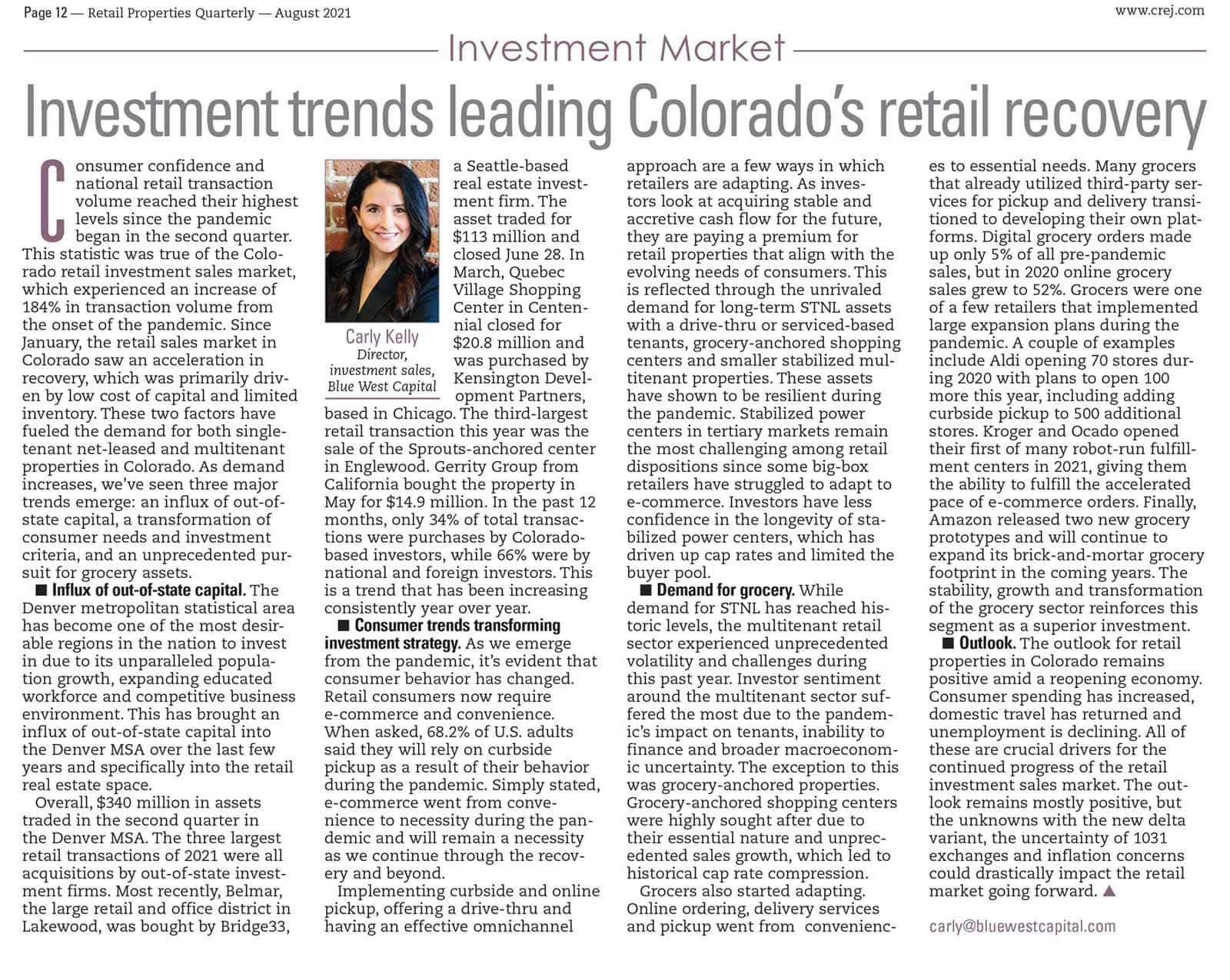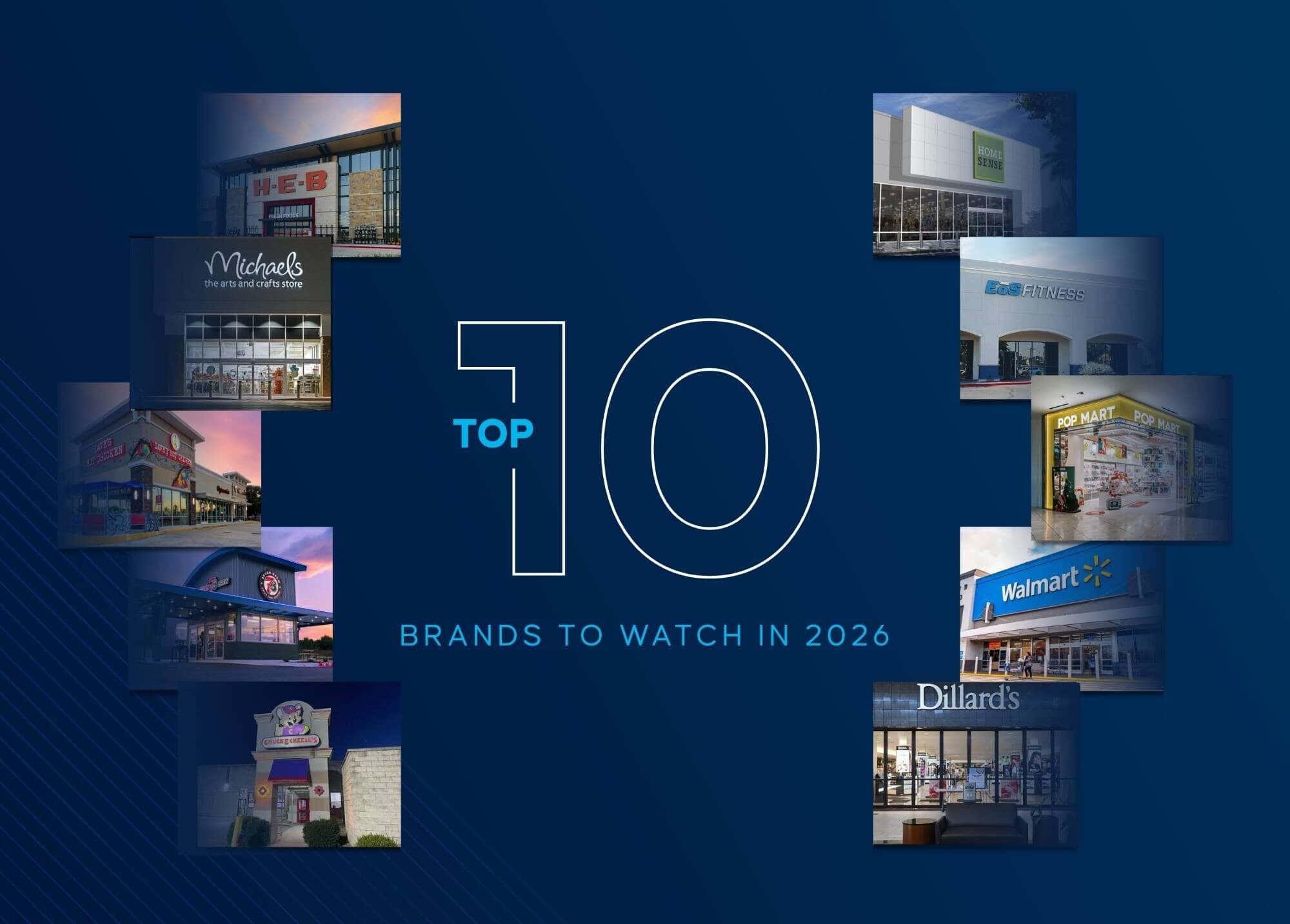written by Carly Kelly, published in CREJ
Consumer confidence and national retail transaction volume reached their highest levels since the pandemic began in the second quarter. This statistic was true of the Colorado retail investment sales market, which experienced an increase of 184% in transaction volume from the onset of the pandemic. Since January, the retail sales market in Colorado saw an acceleration in recovery, which was primarily driven by low cost of capital and limited inventory. These two factors have fueled the demand for both single tenant net-leased and multitenant properties in Colorado. As demand increases, we’ve seen three major trends emerge: an influx of out-ofstate capital, a transformation of consumer needs and investment criteria, and an unprecedented pursuit for grocery assets.
Influx of out-of-state capital. The Denver metropolitan statistical area has become one of the most desirable regions in the nation to invest in due to its unparalleled population growth, expanding educated workforce and competitive business environment. This has brought an influx of out-of-state capital into the Denver MSA over the last few years and specifically into the retail real estate space.
Overall, $340 million in assets traded in the second quarter in the Denver MSA. The three largest retail transactions of 2021 were all acquisitions by out-of-state investment firms. Most recently, Belmar, the large retail and office district in Lakewood, was bought by Bridge33, a Seattle-based real estate investment firm. The asset traded for $113 million and closed June 28. In March, Quebec Village Shopping Center in Centennial closed for $20.8 million and was purchased by Kensington Development Partners, based in Chicago. The third-largest retail transaction this year was the sale of the Sprouts-anchored center in Englewood. Gerrity Group from California bought the property in May for $14.9 million. In the past 12 months, only 34% of total transactions were purchases by Colorado-based investors, while 66% were by national and foreign investors. This is a trend that has been increasing consistently year over year.
Consumer trends transforming investment strategy. As we emerge from the pandemic, it’s evident that consumer behavior has changed. Retail consumers now require e-commerce and convenience. When asked, 68.2% of U.S. adults said they will rely on curbside pickup as a result of their behavior during the pandemic. Simply stated, e-commerce went from convenience to necessity during the pandemic and will remain a necessity as we continue through the recovery and beyond.
Implementing curbside and online pickup, offering a drive-thru and having an effective omnichannel approach are a few ways in which retailers are adapting. As investors look at acquiring stable and accretive cash flow for the future, they are paying a premium for retail properties that align with the evolving needs of consumers. This is reflected through the unrivaled demand for long-term STNL assets with a drive-thru or serviced-based tenants, grocery-anchored shopping centers and smaller stabilized multitenant properties. These assets have shown to be resilient during the pandemic. Stabilized power centers in tertiary markets remain the most challenging among retail dispositions since some big-box retailers have struggled to adapt to e-commerce. Investors have less confidence in the longevity of stabilized power centers, which has driven up cap rates and limited the buyer pool.
Demand for grocery. While demand for STNL has reached historic levels, the multitenant retail sector experienced unprecedented volatility and challenges during this past year. Investor sentiment around the multitenant sector suffered the most due to the pandemic’s impact on tenants, inability to finance and broader macroeconomic uncertainty. The exception to this was grocery-anchored properties. Grocery-anchored shopping centers were highly sought after due to their essential nature and unprecedented sales growth, which led to historical cap rate compression.
Grocers also started adapting. Online ordering, delivery services and pickup went from conveniences to essential needs. Many grocers that already utilized third-party services for pickup and delivery transitioned to developing their own platforms. Digital grocery orders made up only 5% of all pre-pandemic sales, but in 2020 online grocery sales grew to 52%. Grocers were one of a few retailers that implemented large expansion plans during the pandemic. A couple of examples include Aldi opening 70 stores during 2020 with plans to open 100 more this year, including adding curbside pickup to 500 additional stores. Kroger and Ocado opened their first of many robot-run fulfillment centers in 2021, giving them the ability to fulfill the accelerated pace of e-commerce orders. Finally, Amazon released two new grocery prototypes and will continue to expand its brick-and-mortar grocery footprint in the coming years. The stability, growth and transformation of the grocery sector reinforces this segment as a superior investment.
Outlook. The outlook for retail properties in Colorado remains positive amid a reopening economy. Consumer spending has increased, domestic travel has returned and unemployment is declining. All of these are crucial drivers for the continued progress of the retail investment sales market. The outlook remains mostly positive, but the unknowns with the new delta variant, the uncertainty of 1031 exchanges and inflation concerns could drastically impact the retail market going forward.
Be the first to know about new investment properties.
Subscribe to our mailing list




